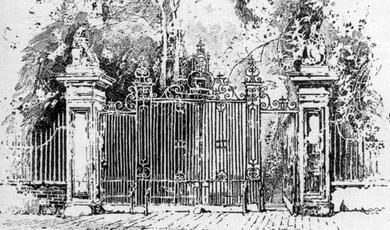Considering the last decade, has the UK Constitution worked or does it need reform?
Share
- Details
- Text
- Audio
- Downloads
- Extra Reading
The Gray's Inn Reading 2024
Does the UK’s constitution provide too much freedom for those that wish to abuse it? Specific examples of this might include Prime Minister Boris Johnson’s lawbreaking during COVID, the selection of Liz Truss as Prime Minister, the ability of the Government to force controversial policies (such as the Rwanda Bill) and the sacking of the Cabinet Secretaries and Permanent Secretaries. Or does the UK constitution, perhaps in contrast to that of the United States and many other nation states, provide relative freedom to remove unsuitable political and civil service leaders without relative domestic political trauma?
Download Text
The Gray’s Inn Reading 2024
“Considering the Last Decade, has the UK Constitution worked or does it need reform?”
Lord Falconer PC KC
Monday 17 June 2024
Thank you for that kind introduction. I am greatly honoured to have been invited to deliver the Gray’s Inn Reading today. This evening, I address the constitutional arrangements for holding government to the law, and the constitution. Is the executive becoming ever less restrained by the law and the constitution, at a time when it is becoming ever less trusted?
My answer is Yes. The Executive is becoming ever less accountable to the law, and much more willing and able to act unconstitutionally than previously. What we do about it will I think depend on whether the last decade and more was an aberration rather than a trend. But political expediency is in the ascendancy, and in a world of an unwritten constitution with protection only for black letter law politics is currently trumping principle.
I deliver this lecture three weeks before a general election. I hope Labour will win because I have been a Labour supporter all my adult life, and because my eldest son is running in the Labour cause in Lincoln.
But this lecture is neither party political nor an expression of my party’s views. I speak in a personal capacity and address matters which will apply whichever government is in power.
Accountability – General
A government has political, constitutional, and legal accountability. Its political accountability depends on the principle that a government can only stay in power for as long as it enjoys the confidence of the House of Commons. That accountability is part of the constitution. It is only enforceable politically.
The removal of Boris Johnson and Liz Truss in quick succession suggests that aspect of the constitution continues to work well.
To the two examples of Johnson and Truss, we should add the example of Teresa May. She lost her flagship policy - her deal negotiated with the EU for Brexit – by over 200 votes, and then by over 150 votes. And she did not resign. Even though it was beyond argument in the face of those unprecedented rebuffs that she did not enjoy the confidence of the Commons.
This is in marked distinction to Neville Chamberlain who resigned in May 1940 after winning a vote on the adjournment of the House treated as a vote of confidence. Chamberlain resigned because the size of the tory rebellion made it clear to him, he had lost the House’s confidence.
Whether there has in practice been a change in the approach to the issue of whether the PM and his government enjoy the confidence of the Commons is not the subject of this lecture. If there has, it is only something politics can deal with. There is no place for law or the courts in this aspect of accountability.
Legal and Constitutional Accountability
But there is more to the Constitution than the question of whether the government continues to enjoy the confidence of the Commons. Recent experience, as I will deal with later, suggests that traditional constitutional norms – in particular the separation of powers between the courts on the one hand, and the executive and the legislature on the other, and the balance of power between the executive and the legislature - are no longer being applied in full. In this lecture when I talk of holding the government to the law and the constitution, I am using the phrase to denote the executive complying with black letter law and complying with clear constitutional conventions which may not be enforceable by the courts, but are part of the constitution.
The Conditions for Effective Compliance with the Law and The Constitution
Being able effectively to hold a government to the law and the constitution has I believe four elements:
-
- First, an independent judiciary and a properly resourced court system willing and able to find against the government when the law dictates.
- Second, access to justice for potential challengers to executive action.
- Third, commitment within government to act in accordance with the law, and the constitution, and effective means to enforce that commitment; and
- Fourth, ensuring the continuation of legal and constitutional structures which apply appropriate limits to executive action.
An Independent Judiciary
As to the courts’ role in ensuring compliance with the law, I have no doubt as to the robust Independence of our judiciary.
Until very recently judges have not, as a group, been in play politically. Over most of the last 50 years they had not been seen either as too right wing or too left wing. They genuinely transcended political typecasting (with the exception of the Irish terrorist cases).
That has to some extent changed. The enemies of the people headline (unrepudiated by the government for days, and indeed supported by one minister) and the attacks on lefty lawyers by ministers carries with it the notion that judges and lawyers are part of an elite standing in the way of liberating the country from an over woke over European over metropolitan overrun with immigrants country.
It is important not to exaggerate the extent to which the judges are in political play in this way. They have shown immense good sense in hardly responding to the attacks. And they retain very widespread confidence – much more confidence than the politicians do.
But the next few years may be rocky. The maintenance of constitutional democracy depends on the main political parties continuing to support and have confidence in the judiciary. Otherwise holding a future government to the law and the constitution becomes much harder. I have no anxiety whatsoever that any incoming Labour government will undermine the standing of the judiciary. A former DPP will not do that.
But the growth of the far right has carried with it attacks and the non-acceptance of institutions on which the maintenance of our democracy depends. And the growth of the far right infects the centre right. It was not just the Farages who attacked lawyers for doing their job. It was politicians holding the highest positions in the state. The consequence of putting the judges in play in this way is that judges inevitably become careful to pick their battles with the executive. And that ultimately weakens the independence of the judiciary. Not because they are cowed. But because they have an eye to politics. Politicians from the mainstream play with fire if they undermine our judges. Undermine them, and you undermine the proper functioning of a constitutional democracy.
After he lost the Prorogation cases Johnson supported by his then AG suggested the Supreme Court decision was political and, in consequence, the process for appointing judges should become more political. He had the support of Professor Ekins, the Professor of Constitutional Law at the University of Oxford. He Boris Johnson and Geoffrey Cox argue that “the Lord Chancellor be allowed to exercise a real discretion in making senior judicial appointments, selecting from a shortlist of well-qualified candidates.”
The system works well in terms of quality and independence. There have been criticisms of the length of time the process can take. And that ministers do not have sufficient interest in the outcome. And that progress on diversity has been insufficient.
The first and last of these critiques have some validity. But I am profoundly against giving ministers more say. It was profoundly fortunate that, after the loss of the prorogation case by the government, it was not open to the Lord Chancellor to interview a short list of judicial candidates for Chief Justice and select the one who would be most in favour of deference to the state.
An appointments system which promotes judicial independence is vital. The current system does that and should be left well alone.
A final point on protecting the independence of judges. They should, if possible, have a strong defender in government, who should be able to speak up for them in private and in public. That is the role the Lord Chancellor should play and sometimes they do it well, and sometimes they don’t.
That role would be immeasurably strengthened if the Ministerial Code spelt out their role in defending the judges, prescribed that ministers must desist or withdraw any criticism if asked to do so by the Lord Chancellor and that the rules of collective responsibility do not apply to the LC when discharging this role.
I do not think the holder of the office needs to be a lawyer. They need to be someone strong minded enough to know when to stand out against colleagues’ attacks on judges. Character and stature not profession are the key requirements.
A Properly Resourced Justice System
I have focused very much on the independence of the judges as a vital component of holding the state to the law. The importance of this requirement should not overshadow two further aspects I referred to earlier in the first two of my lists of four conditions.
First there has to be a sufficiently resourced justice system, and second those who wish to bring JR claims should be able to access the justice system.
It would never occur to us not to properly fund elections. It is vital to democracy. But, just as vital to democracy, is the rule of law. And that means courts sufficiently resourced to ensure there is not undue delays in hearing cases, and legal aid arrangements which allow those who have a challenge to the state with legal merit to pursue that challenge.
Without the rule of law there is no sustained democracy. There is a price to pay to protect our Constitution which is not just the cost of ballot boxes. It is also the cost of a properly resourced justice system, and proper access for all to that system.
Commitment to Law and the Constitution Within Government
Let me move to the third of my four conditions for constitutional arrangements which hold the government to the law – commitment within government to act in accordance with the law and the constitution, and effective means to enforce that commitment. Without doubt the most important means of holding a government to the law is the justice system. But much of what goes on in government never gets to the courts – either because the public never hear of it, or because no one challenges it. And in our system sovereignty resides in parliament which the executive controls. Primary legislation can be used by a government to get round the rule of law, and constitutional norms.
As a nation we undoubtedly have a commitment to the rule of law. We promote it around the world. It is the foundation both of our freedoms and our prosperity. It is the source of huge amounts of invisible earnings through expenditure on UK lawyers. In 2022 the UK legal services sector generated revenue of £42.7 billion, much of it coming from international clients choosing to resolve disputes and make agreements in accordance with English law.
For such a commitment to be convincing and reliable it must be steadfast. Investors in the UK, and citizens of the UK alike, need to know that the commitment applies come what may and does not give way to the political demands of the government.
Within government, ministers and civil servants alike are bound by the Ministerial Code and the Civil Service Code respectively which require them to comply with the law, including international law. The government has well-regulated rules for ensuring that all that it does complies with the law. To the extent there are disagreements about the law they are resolved by the opinion of the Law Officers. Their views are authoritative. Both on the Law, and the Constitution.
The Undermining of That Commitment
This legal eco-structure has been significantly undermined in recent years. The Internal Markets Act expressly allowed the government to break the terms of the EU/UK Irish protocol when such a breach would inevitably involve a breach of international law. The Advocate General, Lord Keen of Elie, a distinguished Scottish lawyer, resigned in the face of this abandonment of law.
The Safety of Rwanda (Asylum and Immigration) Act passed in the dying days of the last parliament was a clear breach of the constitutional principle of the separation of power between the courts on the one hand, and the executive and the legislature on the other.
As is well-known the Supreme Court concluded Rwanda was not a safe country within the meaning of the Immigration Rules. Those rules provide that, to qualify as a safe country, the principle of non-refoulement must be respected.
The principle of non-refoulement requires that the refugee should not be returned to the place from which he or she fled. The Immigration Rules permit the courts to determine whether a country is safe in accordance with the Rules, as a primary issue of fact, not simply on the basis of a Wednesbury challenge to a finding of a minister or an immigration officer.
The Supreme Court found unanimously there was: “a culture within Rwanda of, at best, inadequate understanding of Rwanda’s obligations under the Refugee Convention.” And that “It is also apparent from the evidence that significant changes need to be made to Rwanda’s asylum procedures, as they operate in practice, before there can be confidence that it will deal with asylum seekers sent to it by the United Kingdom in accordance with the principle of non-refoulement. The necessary changes may not be straightforward, as they require an appreciation that the current approach is inadequate, a change of attitudes, and effective training and monitoring.”
Despite the Supreme Court findings of a fundamentally flawed system requiring major surgery, the government, on 5 December 2023 – 19 days after the Supreme court handed down their judgment – entered into a further Agreement with the government of Rwanda which they asserted put right all the problems identified in the Judgment.
On 7 December 2023 – 22 days after judgment was handed down – the Government introduced into the Commons the Bill which prescribed, despite the findings made by the Supreme Court, that it “gives effect to the judgement of Parliament that the Republic of Rwanda is a safe country”.
This law then provided that every decision maker must conclusively treat the republic of Rwanda as a safe country and it further provided that the courts must not consider a review or Appeal against the decision either of the minister or an immigration officer on the basis Rwanda is not a safe country.
It passed without significant amendment in the form introduced. The courts usurped, and then legislatively barred from putting it right. The law absolutely clear from the Act.
The Courts of the UK are bound to give effect to the Act. Yet the Act is unconstitutional because it breaches the separation of powers. Courts, not Parliament, decide the factual question of whether a country is safe. Passing the Act was to circumvent court control of the executive.
There is no remedy which the courts can give for its unconstitutionality. It is for parliament to decide whether to pass it. In the Commons the government have a majority, and in the Lords, whilst we are willing to amend Bills to make the government think again as we did with this one, if the Commons think again and make no changes then in the context not just of a Bill which was in a winning party’s manifesto but any Bill which is a central part of its programme we will not hold out.
This Act, and the Internal Market Act demonstrate a government where politics can trump the constitution. And there is no institution – court or second chamber – which has the task of holding them to the constitution.
Would it have been different if the reforms of 2005 had not taken place? Most people accept the need for an independent Judicial Appointments Commission, and for a fully functioning ministry of justice, and for a secretary of state who does not spend the great bulk of his day inert on the woolsack, and the impossibility of a senior cabinet minister also being the chair of the final court of appeal and the head of the English judiciary. But they hanker for a big legal figure, such as Lord Chancellors of old, who would, separately from the Attorney general, stand up for the rule of law within government. And if they said no, and surely, they would have said No to the Safety of Rwanda Act, that would have ended it. I fear not.
Lord Kilmuir, the Lord Chancellor, was summoned by Macmillan at 11.15am on Friday 13th July 1963. With no prior warning, he was told he was to be replaced with effect from 7pm that evening. He bravely went on with his programme for the day which included only one further official engagement, namely a cocktail party at the Land registry. Heuston writes: “It was not an occasion remembered with pleasure by anyone who was there.” It is said Kilmuir complained he was being given less notice than he would have to give his cook, to which Macmillian is said to have replied that cooks were much harder to come by than Lord Chancellors. Whether this exchange occurred, it illustrates how the whole structure depended on appointments by the PM.
A cabinet minister should not be the head either of the judiciary of England or Wales, nor the head of the final court of appeal. It is fundamentally wrong. And it was from those two positions that the Lord Chancellor derived his especial authority. There is no going back. Nor should there be. That was the classic failure to separate the judges from the executive and the legislature.
There may in the future need to be more solid structural protections to protect the constitution. For example, either the courts having wider powers to strike down or not apply parts of legislation which are unconstitutional, or a second chamber with wider powers to block unconstitutional legislation. I support neither of these proposals in this lecture. They would both require much further thought. Rather I seek to draw attention to the increasing gulf between that which is lawful, and that which is unconstitutional.
Maintaining Structures that Preserve the Balance Between Executive and Legislature
The final condition to hold the government to the law and the Constitution is ensuring legal structures which apply appropriate limits to executive action. Increasingly the executive promotes primary legislation giving huge power to ministers and other bodies which would previously have required either primary or secondary legislation.
The four methods of circumventing proper parliamentary scrutiny and in many cases any scope for legal challenge were identified in a seminal joint report by two select committees of the House of Lords, published in November 2021. The day jobs of those committees are to draw the Lords’ attention to anything unusual in delegated powers the government is proposing.
The committees which are cross party, and no party became so concerned with what they saw as a fundamental undermining of the role of parliament in favour of the accretion of executive power over a prolonged period of time that they published this report. They described how the government was using a variety of means to shift the balance away from the legislature to the executive:
a. Skeleton legislation: where little of the policy is included on the face of the bill but, instead, left to delegated legislation which Parliament cannot amend but only accept or reject, with rejection being a rare occurrence and fraught with difficulty.
b. Henry VIII powers: where ministers can repeal or amend an Act of Parliament by regulations.
c. Legislative sub-delegation of power: where ministers can confer powers on themselves or other bodies (and which may include a power to amend or even repeal an Act of Parliament). This tertiary legislation has as much legal force as any other form of law.
d. Disguised legislation: perhaps the most striking and disturbing recent development, where ministers can exercise legislative powers using various devices — such as guidance, determinations, protocols — often not subject to parliamentary scrutiny.
The wider the power – because there is less material in primary legislation to define how it should be exercised – the greater the reduction in parliamentary scrutiny, but also the harder it was to identify any legal basis of challenge. Using these techniques is positively recommended in Cabinet Office Guidance to Legislation, a manual for government departments and parliamentary draughtsman as to how to legislate.
The Joint Committees’ Report recommended in November 2021 as follows:
“We therefore recommend significant amendments to the Cabinet Office Guide to Making Legislation — the bible which officials must follow — including an explicit assertion of the fundamental principles of parliamentary democracy as the basis for the way in which bills are framed.”
Legislation which offends in one or other of the four ways the two Lords’ Committees identified is unconstitutional for all the reasons they set out. It is a further example where legislation sets out the law, but the legislation is unconstitutional. And there is nothing the courts can do about it.
Conclusion
In this lecture I have sought to identify what I believe to be a gradual but significant weakening of constitutional and legal restraints on what the executive does. The main driver of this is the increasing intensity of the battle for political advantage. The ability of the State to hold the executive to the law and to the constitution is what prevents elective dictatorship.
We must hope that the things I have identified have been a period of aberration and the triumph of politics over everything else is not the picture of the future.
© Lord Falconer PC KC, 2024
Part of:
This event was on Mon, 17 Jun 2024
Support Gresham
Gresham College has offered an outstanding education to the public free of charge for over 400 years. Today, Gresham College plays an important role in fostering a love of learning and a greater understanding of ourselves and the world around us. Your donation will help to widen our reach and to broaden our audience, allowing more people to benefit from a high-quality education from some of the brightest minds.


 Login
Login







